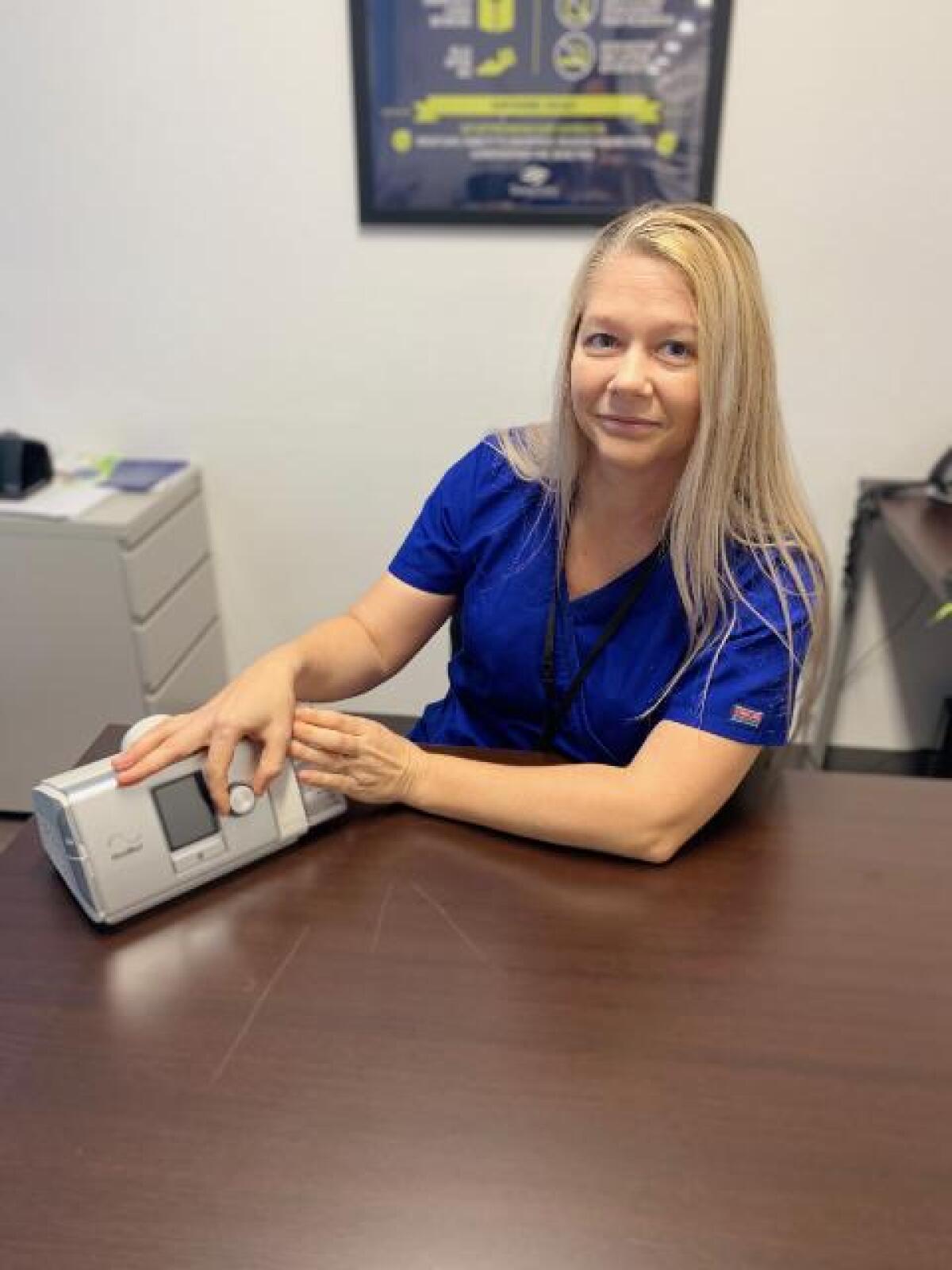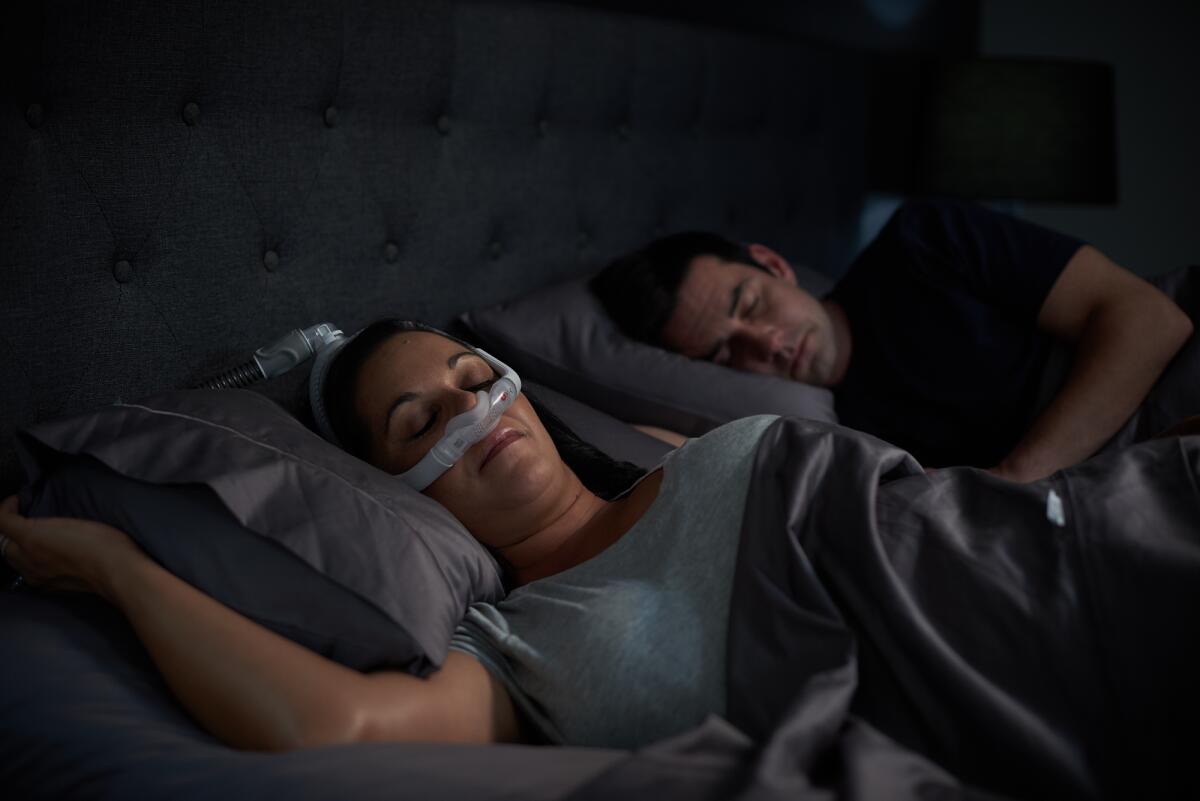Sleep problems are attacking our health. A Southern California company is helping us fight back.
San Diego-based medical device company ResMed offers a wide-ranging suite of cloud-connected machines, apps and software solutions. All are built to improve quality of life among sufferers of sleep apnea and other disorders that disrupt sleep.
Christy Guerrero knows firsthand how hard it can be to get a good night’s sleep.
Guerrero, a San Diego-based respiratory therapist, is one of many hardworking healthcare professionals providing direct care every day to scores of groggy people nationwide. Roughly 70 million Americans suffer from chronic sleep problems, according to the Centers for Disease Control and Prevention. There’s insomnia, restless leg syndrome, and sleep apnea — Guerrero’s area of expertise — which alone afflicts more than 54 million Americans and costs the American healthcare system an estimated $150 billion every year.
Sleep apnea is a chronic condition that causes people to stop breathing for 10 seconds or more throughout the night, which, in turn, causes them to repeatedly wake up to gasp for air to prevent suffocation. While Guerrero’s patients rarely remember waking up, the disruptive cycle causes chronic sleep deprivation.
“Generally,” she said, “we see tired patients who are constantly fatigued or agitated — easily irritable.”

The secondary effects of sleep apnea and its resulting sleep deprivation are most dangerous, leading to decreased mood and productivity, increased risk of a workplace or motor vehicle accident, higher risk of heart disease, higher risk of or worsening of obesity, hindrance of management of Type 2 diabetes, and more.
Guerrero’s work treating sleep apnea, then, is a critical form of preventative care.
Her solution of choice — and the medical industry’s at large — is positive airway pressure (PAP) machines that blow a mild stream of air into the upper airway, keeping it open to maintain breathing during sleep and prevent suffocation. It’s Guerrero’s job to help improve her patients’ sleep, their mood, and their overall health by finding a PAP machine and mask that fits comfortably and is easy for them to use, plus a monitoring program and other support tools to facilitate their long-term success in treatment.
Treatment hasn’t always been easy. Historically, patients have found most PAP devices to be discouragingly clunky, Guerrero said. As a result, only about half of patients would stick with their treatment program. On top of that, she had to manually record each patient’s sleep data, a meticulous and time-consuming process that didn’t always yield the best information.
Today, there are dozens of masks to choose from. Many feature smaller formats, lower profiles, softer headgears, easy-to-fit magnetic clips, even different cushion materials (silicone vs. foam, for instance).
There are also smart PAP devices.

Video: 30 Years of ResMed (Paid Post)
In 2014, ResMed, a San Diego-based medical device company, became the first to build cloud connectivity into its entire line of PAP machines. By enabling computerized, remote monitoring by medical professionals like Guerrero, as well as monitoring by the patients themselves, this single innovation has helped to boost rates of adherence to treatment up to 87%, according to ResMed. (Compare that to a PAP adherence rate of roughly 50% on non-cloud connected devices.)
With their consent, Guerrero can easily see patients’ sleep data the next day on her desktop sparing them from scheduling and driving to appointments. Within the system, patients are automatically grouped by therapy issue so therapists can quickly identify who needs help getting back on track. In some cases, therapists can change a patient’s device settings through the cloud using a feature called Remote Assist, saving everyone time, money, and frustration.
“The ability for me to see my patients’ data on PAP therapy right on my screen allows us to be proactive versus reactive in managing their therapy,” she said, “which I believe has drastically increased the overall compliance and improved patient outcomes.”
Patients can also see their own data on their smartphone with ResMed’s myAir app, which provides insight on how they slept the night before according to a simple 1-to-100 score. More than 1.8 million people worldwide have downloaded the app.
“My patients can view their score every day and strive to maximize their score each night,” Guerrero said. “The app’s scoring lets them know how their mask is fitting, how many times they woke up, and how well their apnea is being treated.”

Cloud connectivity has allowed ResMed to transform from a leading medical device company to a global connected health pioneer. In addition to selling more than 9 million cloud-connectable PAP devices, ResMed offers remote monitoring with its in-home ventilators for people with COPD and other lung diseases, and, thanks to a recent acquisition, now helps people with COPD and asthma track their inhaler use via a cloud-connected sensor.
Additionally, ResMed has spent more than $1.5 billion to acquire backend software companies that help out-of-hospital care providers run more efficiently; these include Brightree, MatrixCare and HEALTHCAREfirst.
These technologies have also helped to make Guerrero’s work easier.
“I like Brightree because it is an electronic medical record system specifically designed for (durable medical equipment such as PAP devices),” she said. “I’m able to quickly and clearly troubleshoot and solve a patient’s issues right in the system. Brightree is also integrated with AirView, which allows us to easily enroll patients and view their data without having to waste time toggling between different software programs. It’s all right there.”
“I feel like the overall quality of all ResMed’s products, and the care the company has for patients, shows through all their innovations,” she continued. “We’ve seen that compliance, nationally, is on the rise just because the patients are more aware and more engaged.”
—Paul Rogers for ResMed